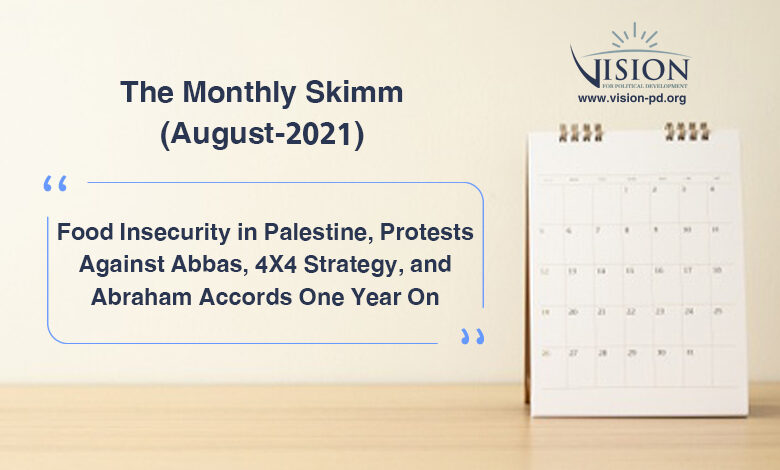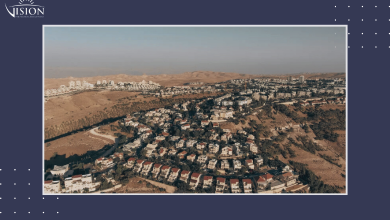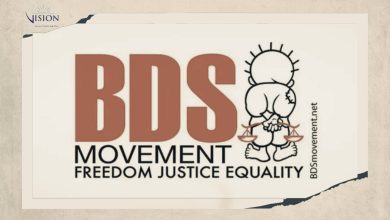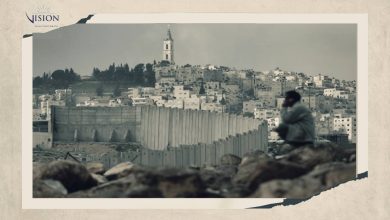The Monthly Skimm (August 2021): Food Insecurity in Palestine, Protests Against Abbas, 4X4 Strategy, and Abraham Accords One Year On

Mohammed Hasan: Researcher in Political Science
Food Insecurity in Palestine
Susanna Reskallah noted that the Israeli government deprives Palestinians from the use of their own lands, which engenders food insecurity in Palestine. Food security is considered a critical step toward Palestinian self-determination. Accordingly, the Palestinians will not be able to build a state based on a two-state solution. The Palestinian market relies on food and 82.5% of it is imported. Interestingly, Farming accounts for only 4.8% of GDO in Gaza, and 2.6% of GDO in the West Bank (Reskallah, 2021).
The Indications of Protests against Abbas
Yohanan Tzoreff expresses serious concerns about Palestinian scene following Abu Mazen’s rule (Tzoreff, 2021). In his article entitled “The Palestinian Arena: Dangerous Deterioration” published by the Institute For National Security Studies, Tzoreff believes that mass demonstrations, harsh criticism, and conflict to Abu Mazen’s security apparatus should not be underestimated, even without immediate threat, the situation can be dangerous if Abbas left the political scene.
Does Hamas stand arms folded?
In a descriptive report titled “Hamas’ Advanced Weaponry: Rockets, Artillery, Drones, Cyber,” Ben-David notes that Hamas is now producing much of its own weapons, expanding research, involved in cyber warfare, and are about to advance to GPS-guided missiles and drones. Logistically, there is high coordination between Hamas, Hezbollah, and Iran, which eases the process of transiting the required materials and components from Sudan and Libya (Ben-David, 2021).
The Feasibility of Bringing the Conflict into International Criminal Court
In an article published by Washington Institute called “State of Investigation? The International Criminal Court and the “Situation in Palestine,” Alexander Loengarvo discusses the treatment of allegations against Israel form the standpoint of the dilemma of importing political confrontations into the courtroom (Loengarov, 2021). He emphasizes that the criminal court will not be able to imply what contradicts the power of states. Accordingly, he underestimates the effectiveness of involving the international criminal court in political issues such as the Israeli-Palestinian conflict.
4X4 Strategy to Confront Threats against Israel
Dror Shalom makes the best effort to portray Hamas as a barbaric dogmatic movement (Shalom, 2021). In his article published in the Washington Institute “Proposing as Alternative to Israeli-Palestinian (Conflict Management),” he discusses the context of the regional threat to Israel as represented by Iran and its allies Hamas and Hezbollah. He sees the confrontation as a matter of time, and there is higher likelihood of multiple concurrent confrontations. Accordingly, he suggests the 4×4 strategy.
4×4 Strategy consists of Four Principles and Four Steps:
Principles:
First, take initiative: The Israeli government should not react to provocation, it must proactively influence actuality.
Second, think systemically: Put together an integrative approach in reaction to the Palestinian challenge. Assume that despite the inherent conflicts and problems of the PA, they are preferable mediators to extremist Hamas.
Third, harness momentum in order to promote deeper involvement by Pragmatic Arab Regimes.
Fourth, Build Readiness: Build operational readiness for potential military action, and build political legitimacy.
Steps:
- Establish a durable ceasefire.
- Set the terms of conditional humanitarian reconstruction in Gaza.
- Empower the Palestinian Authority.
- Promote long-run infrastructure projects in Gaza.
The Consequences of Taliban’s Success on Israeli Security
Kobi Michael sees a threat to Israeli security after the Taliban’s takeover of Afghanistan (Michael, 2021). Accordingly, he recommends that the United States and Israel build a coordinated strategy in the region to confront related groups as this will help nation-states to regain trust in American commitments to its partners in the region. In order to prevent Afghani influence, he recommends the Israeli government to:
- Make strategic changes to the regional system, where Iran makes up a threat to Israeli security.
- Promote counter-system in the region against Iran proxy actions.
- Dealing with threatening groups must be comprehensive not piecemeal.
An Obvious American Strategy in MENA?
There is a way that the Middle East can impose its will, while Biden’s team continues to lacks a discernable region-wide strategy that satisfies US partners (Pollack, 2021). Kenneth Pollack and Dennis Ross have visited some countries in the Middle East to learn about leaders’ impressions of countries such as Israel, Iraq, and Saudi Arabia. Middle Eastern leaders seem to be confused about the strategy the United States will adopt regarding the region’s issues.
China and Israeli-Palestinian Conflict
China seems to generally adopt the policy of non-interference in foreign conflicts; however, China is attempting to get involved in the Israeli-Palestinian conflict (Lavi, 2021). Galia Lavi believes that China uses the conflict to taunt the US and to invest politically at Israeli’s expense. The strategic tension between the US and China is influencing Israel negatively.
The Abraham Accords One Year On
Roie Yellinek mentions in “The Abraham Accords One Year On” that economic relations between the countries signed onto the Abraham Accords is increasing (Yellinek, 2021). The UAE has greatly exceeded the rest. The post-covid era will witness a noticeable rise in business and trade exchange. Furthermore, Dubai and Morocco are the most visited destinations by the Israelis due to status of Dubai as a touristic destination and the connection one million Israelis with Morocco who have Moroccan origins
Regionally, some sides of the accords are still successful in building a regional block against Turkish and Iranian influence, despite Biden’s unlikely investment into the accords Yossi Kuperwasser, in another context, believes that the rapid collapse of Kabul’s government should teach the Israeli government that it must be able to defend itself in the face of Iranian and Palestinian threats. It must work regionally to promote itself as a stable pillar for moderates in the region (Kuperwasser, 2021).
References:
Shalom, D. (2021). Last Call for Gaza? Proposing an Alternative to Israeli-Palestinian “Conflict Management”. Retrieved from The Washington Institute: https://www.washingtoninstitute.org/policy-analysis/last-call-gaza-proposing-alternative-israeli-palestinian-conflict-management
Loengarov, A. (2021). State of Investigation? The International Criminal Court and the “Situation in Palestine”. Retrieved from Washington Institute: https://www.washingtoninstitute.org/policy-analysis/state-investigation-international-criminal-court-and-situation-palestine
Michael, K. (2021). How Afghanistan Influences Hamas, PIJ, and Iran in their Approach to Israel . Retrieved from Washington Institute: https://www.washingtoninstitute.org/policy-analysis/how-afghanistan-influences-hamas-pij-and-iran-their-approach-israel
Reskallah, S. (2021). Food Insecurity in Palestine: A Future for Farmers. Retrieved from Wilson Center: https://www.wilsoncenter.org/article/food-insecurity-palestine-future-farmers
Pollack, K. (2021). Biden needs a Middle East strategy to avoid new crises. Retrieved from The Hill: https://thehill.com/opinion/international/567095-biden-needs-a-middle-east-strategy-to-avoid-new-crises
Tzoreff, Y. (2021). The Palestinian Arena: Dangerous Deterioration. Retrieved from The Institute For National Security Studies: https://www.inss.org.il/publication/west-bank-escalation/
Lavi, G. (2021). China and the Middle East: The Israeli-Palestinian Conflict on the Agenda. Retrieved from The Institute for National Security Studies: https://www.inss.org.il/publication/china-middle-east/
Yellinek, R. (2021). The Abraham Accords one year on. Retrieved from Middle East Institute: https://www.mei.edu/publications/abraham-accords-one-year
Kuperwasser, Y. (2021). The Lesson from the U.S. Strategy in Afghanistan: Israel Must Recognize the Limits of Superpower Support. Retrieved from Jerusalem Center for Public Affairs: https://jcpa.org/%E2%80%8Ethe-lesson-from-the-u-s-strategy-in-afghanistan-israel-must-recognize-the-limits-of-superpowers-support/
Ben-David, L. (2021). Hamas’ Advanced Weaponry: Rockets, Artillery, Drones, Cyber. Retrieved from Jerusalem Center for Public Affairs: https://jcpa.org/article/hamas-advanced-weaponry-rockets-artillery-drones-cyber/





